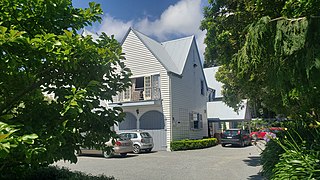
Sir Robert David Muldoon was a New Zealand conservative politician who served as the 31st prime minister of New Zealand, from 1975 to 1984, while leader of the National Party.

The 1984 New Zealand general election was a nationwide vote to determine the composition of the 41st New Zealand Parliament. It marked the beginning of the Fourth Labour Government, with David Lange's Labour Party defeating the long-serving Prime Minister, Robert Muldoon, of the National Party. It was also the last election in which the Social Credit Party won seats as an independent entity. The election was also the only one in which the New Zealand Party, a protest party, played any substantial role.

Sir Trevor Colin Mallard is a New Zealand politician. He currently serves as Ambassador of New Zealand to Ireland since 2023. He was a Member of Parliament from 1984 to 1990 and again from 1993 to 2022. He served as Speaker of the New Zealand House of Representatives from 2017 until 2022.

The New Zealand Party operated as a political party in New Zealand from 1983 to 1993. Established by millionaire property tycoon Bob Jones, the party promoted economic liberalisation—it was the first political party to promote free market reforms. It failed to win any seats in Parliament, but it purportedly played a role in causing the defeat of Robert Muldoon's National government in the 1984 election by splitting the vote.

Sir James Kenneth McLay is a New Zealand diplomat and former politician. He served as the ninth deputy prime minister of New Zealand from 15 March to 26 July 1984. McLay was also Leader of the National Party and Leader of the Opposition from 29 November 1984 to 26 March 1986. Following his ousting as party leader, he retired from parliamentary politics in 1987. In June 2009, he became New Zealand's Permanent Representative to the United Nations. In May 2015, McLay became New Zealand's Representative to the Palestinian Authority. From May 2016 to January 2017, he was New Zealand's Consul General in Honolulu.

Derek Francis Quigley is a New Zealand former politician. He was a prominent member of the National Party during the late 1970s and early 1980s, and was known for his support of free-market economics and trade liberalisation. Quigley left the National Party after clashing with its leadership, and later co-founded the ACT New Zealand party.

The 1975 New Zealand general election was held on 29 November to elect MPs to the 38th session of the New Zealand Parliament. It was the first general election in New Zealand where 18- to 20-year-olds and all permanent residents of New Zealand were eligible to vote, although only citizens were able to be elected.

Sir David Stuart Beattie, was an Australian-born New Zealand judge who served as the 14th governor-general of New Zealand, from 1980 to 1985. During the 1984 constitutional crisis, Beattie was nearly forced to dismiss the sitting prime minister, Robert Muldoon.
The following lists events that happened during 1975 in New Zealand.
The following lists events that happened during 1979 in New Zealand.
The following lists events that happened during 1980 in New Zealand.
The following lists events that happened during 1984 in New Zealand.

The Third National Government of New Zealand was the government of New Zealand from 1975 to 1984. It was an economically conservative government that aimed to preserve the Keynesian economic system established by the First Labour government and was also socially conservative. Throughout its three terms it was led by Robert Muldoon, a populist but antagonistic politician who was sometimes described as the National Party's best asset and worst liability.

The New Zealand constitutional crisis of 1984 arose following the 1984 general election, and was caused by a major currency crisis. The crisis led the incoming government to review New Zealand's constitutional structures, which resulted in the Constitution Act 1986.

Hugh Campbell Templeton is a former New Zealand diplomat, politician and member of parliament for the National Party.
Bill Ralston is a New Zealand journalist, broadcaster, and media personality, active in television, radio and print. He has worked as a political correspondent, fronted the television arts show Backch@t, and was the head of news and current affairs at TVNZ from 2003 to 2007. The New Zealand Herald has described him as controversial.

Vogel House at 75 Woburn Road, Lower Hutt, New Zealand is a neo-Georgian-style home built in 1933. For 13 years was the official residence of the Prime Minister of New Zealand, and it housed multiple other ministers and dignitaries.

Fitzgerald v Muldoon and Others is a 1976 New Zealand Supreme Court case concerning whether press statements by Robert Muldoon had breached section 1 of the Bill of Rights 1688. In its decision, the court ruled "That the pretended power of suspending of laws, or the execution of laws, by regal authority, without consent of Parliament, is illegal". The case has since become one of New Zealand's most important constitutional law decisions.

Sir George Alan Chapman is a New Zealand accountant, businessman and company director. He was president of the National Party from 1973 to 1982.
Renae Maihi is a New Zealand film director and screenwriter. She is best known for her work on the films Waru and We Are Still Here, both of which premiered at the Toronto International Film Festival in 2017 and 2022 respectively.












